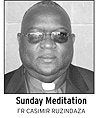This Sunday, Christians are celebrating the feast of the Baptism of the Lord Jesus; with the following readings for meditation: Isaiah 42:1-4, 6-7; Psalm 29; Acts 10:34-38; Matthew 3:13-17.


This Sunday, Christians are celebrating the feast of the Baptism of the Lord Jesus; with the following readings for meditation: Isaiah 42:1-4, 6-7; Psalm 29; Acts 10:34-38; Matthew 3:13-17.
The main theme of this feast is on Jesus’ call to all nations for personal conversion. In the Gospel, we see him being baptized by John the Baptist though he did not need any kind of cleansing.
He wanted to please his heavenly Father, by submitting himself to baptism and at the same time, he was giving the whole world a gesture which demanded repentance.
And he did it in a very humble way, because his style is to avoid breaking the bruised reed as we read in the first reading.
Through his baptism, Jesus was being exemplary. He was observing the Mosaic law and the practices linked to a good Jewish life.
And this kind of humility provided a model for his ministry which he accomplished modestly and very quietly.
Jesus set once for all a good example of leadership; he leads the people gently toward an interior transformation, rather than stressing external conformity.
He knows that man learns best by way of example and that crucial decisions should be made in relative calm. And this includes the decision to change people’s way of life or conversion.
It is very interesting to note that the Spirit of God which hovered over the waters at creation (Gen. 1:2) hovered as well over the waters which were made new by their contact with God-made-man.
This gesture of Jesus made a new beginning for the world, and did something special to every individual’s life; bringing hope of a fresh beginning in whatever situation hopeless as it may seem: Now we know that man can change and be converted.
Through his own baptism, Jesus taught us that baptism brings about death to sin and entry into the life of the Trinity through configuration to the paschal mystery of Christ. In Isaiah we read that the Lord sends his messenger "to open the eyes of the blind.”
But our problem today comes from the fact that people must first admit their blindness, in order for the Messiah to work his wonders.
Today people do not easily admit their weakness. They will always do any thing to justify their actions even in the wrong. John tells us that such an attitude is very dangerous: "If you were blind, you would have no sin; but now you are saying, ´We see, ´ so your sin remains” (Jn 9:41).
Ever since it’s beginning, the Church upholds the necessity of baptism. It is a sacrament which makes a big change in the life of the baptized.
It commits Christians to participating seriously and actively in the Church’s liturgy and to exercise their baptismal priesthood by the witness of holy lives and practical charity.
When Christianity is taken seriously, it commits a Christian to a life of prayer accompanied by different works of apostolate as each Christian may be inspired by the Holy Spirit. That is if we pay attention to Him.
Baptism by its very nature does not call for personal conversion only, but it requires a kind of an ongoing catechesis.
Learning about the faith is a lifelong task. That is why parents where ever it is possible should facilitate for their children a constant exposure to solid Catholic media, periodicals, books, videos and so on.
This is for the simple reason that one cannot love what one does not know. It is very important for every home to have a copy of the Bible, and the Catechism of the Catholic Church or its question-and-answer type Compendium.
These help a lot in children’s Christian upbringing. Our Christian faith should not be taken for granted. It is a very precious gift, and not everyone has it.
Statistics show that two-thirds of the world’s people are non-Christians. Hence, baptism, by incorporating us into communion with Christ, raises the bar of what Christ expects of us. One such expectation from each Christian is the proclamation of the Good News in our daily lives.
We all know that this is not easy, but the Holy Spirit acts as a kind of divine software in us, which acts as man’s supreme guide and light of the human spirit.
Hence after our birth in baptism, our growth in spiritual life requires docility to the workings of the Holy Spirit.
Ends


